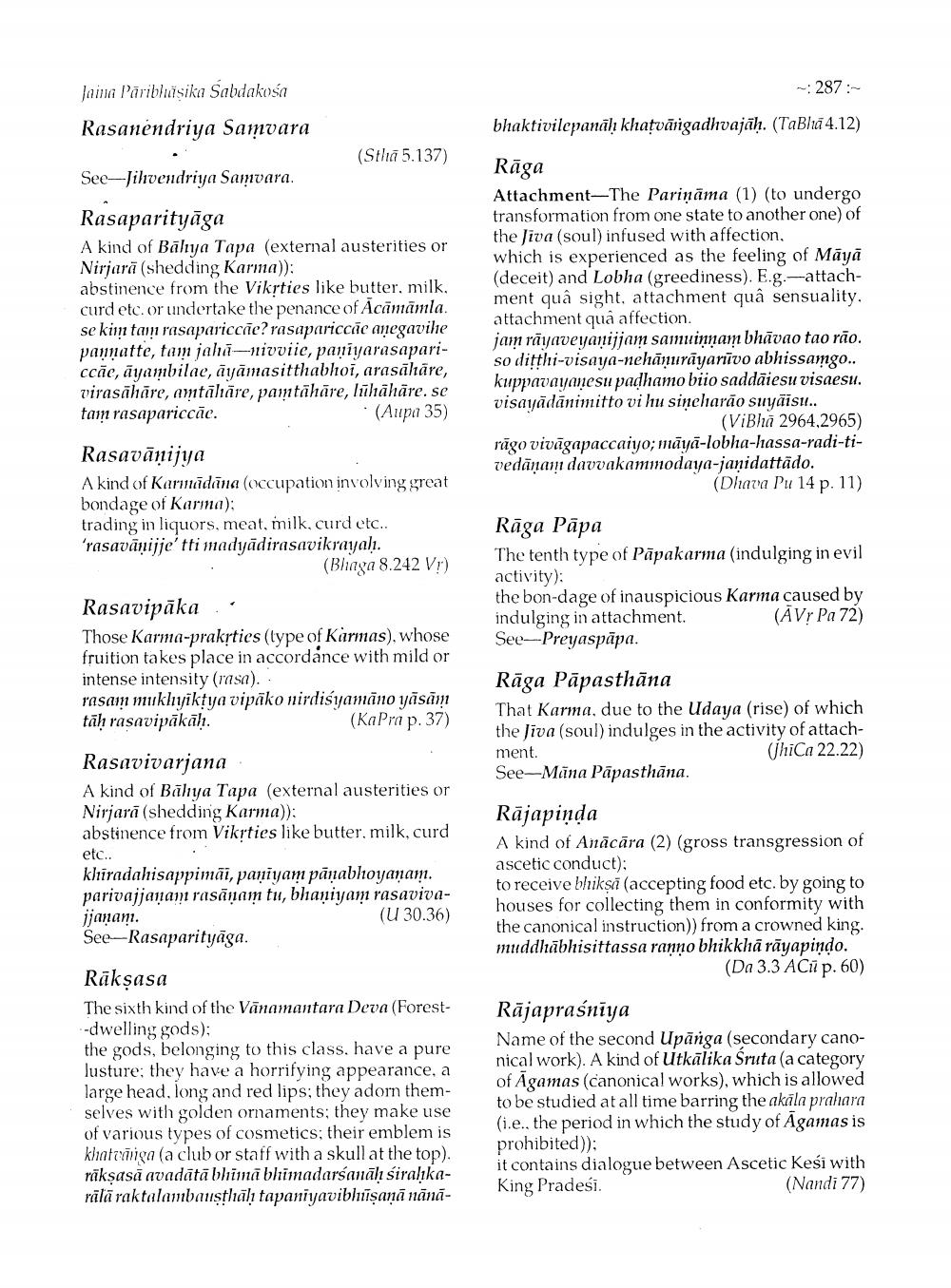________________
-287
Jaina Päriblasika Sabdakosa Rasanendriya Samvara
bhaktivilepanāh khatvārigadhvajā”. (TaBlā 4.12)
(Stha 5.137)
See-Jilvendriya Samvara.
Rasaparityāga A kind of Bālıya Tapa (external austerities or Nirjarā (shedding Karma)): abstinence from the Vikrties like butter, milk, curd etc. or undertake the penance of Acāmāmla. se kim tam rasapariccae? rasapariccrc anegavihe pannatte, tain jahi-rivviie, paniyarasapariccēc, āyambilae, āyāmasitthabhoi, arasältäre, virasähāre, amtālāre, paintāhāre, lūhāhāre, se tain rasapariccoc.
(Aupa 35)
Rāga Attachment-The Pariņāma (1) (to undergo transformation from one state to another one) of the Jiva (soul) infused with affection, which is experienced as the feeling of Māyā (deceit) and Lobha (greediness). E.g.--attachment quâ sight, attachment quâ sensuality. attachment quâ affection. jam rāyaveyanijjam samuinnam bhāvao tao rão. so ditthi-visaya-nehānurāyarivo abhissamgo.. kuppavayanesu padhamo biio saddāiesu visaesu. visayādānimitto vi hu sineharão suyaisu..
(ViBhā 2964,2965) rāgo vivāgapaccaiyo; māyā-lobha-hassa-radi-tivedāṇam davvakammodaya-janidattādo.
(Dhava Pu 14 p. 11)
Rasavānijya A kind of Karinādana (occupation involving great bondage of Karma); trading in liquors, meat, milk, curd etc.. 'rasavānijje' tti madyādirasavikrayah.
(Bhaga 8.242 Vr)
Rāga Pāpa The tenth type of Pāpakarma (indulging in evil activity): the bon-dage of inauspicious Karma caused by indulging in attachment.
(AV; Pa 72) See-Preyaspāpa.
Rasavipāka ' Those Karma-prakrties (type of Karmas), whose fruition takes place in accordance with mild or intense intensity (rasa). rasam muklıyiktya vipāko nirdiśyamūno yāsām tāḥ rasavipākāh.
(Ka Prap. 37)
Rāga Pāpasthāna That Karma, due to the Udaya (rise) of which the Jiva (soul) indulges in the activity of attachment.
(hiCo 22.22) See-Mūna Pāpasthāna.
Rasavivarjana A kind of Bālya Tapa (external austerities or Nirjarā (shedding Karma)); abstinence from Vikrties like butter, milk, curd etc.. kliradahisappimai, paņiyam pāṇabhoyanam. parivajjanam rasanam tu, bhaniyam rasavivaijanani.
(U 30.36) See-Rasaparityāga.
Rājapinda A kind of Anācāra (2) (gross transgression of ascetic conduct); to receive bhikṣā (accepting food etc. by going to houses for collecting them in conformity with the canonical instruction)) from a crowned king. muddhābhisittassa ranno bhikkhā rāyapindo.
(Da 3.3 ACü p. 60)
Rākşasa The sixth kind of the Vānamantara Deva (Forest--dwelling gods); the gods, belonging to this class, have a pure lusture; they have a horrifying appearance, a large head, long and red lips; they adorn themselves with golden ornaments, they make use of various types of cosmetics; their emblem is khatuñiga (a club or staff with a skull at the top). rākṣasā avadātā bhima bhimadarsanāh siralıkarilā raktalambaustrāl tapaniyavibhuşanā nāna
Rājapraśnīya Name of the second Upānga (secondary canonical work). A kind of Utkālika Sruta (a category of Agamas (canonical works), which is allowed to be studied at all time barring the akala prahara (i.e. the period in which the study of Āgamas is prohibited)); it contains dialogue between Ascetic Kesi with King Pradesi.
(Nandi 77)




